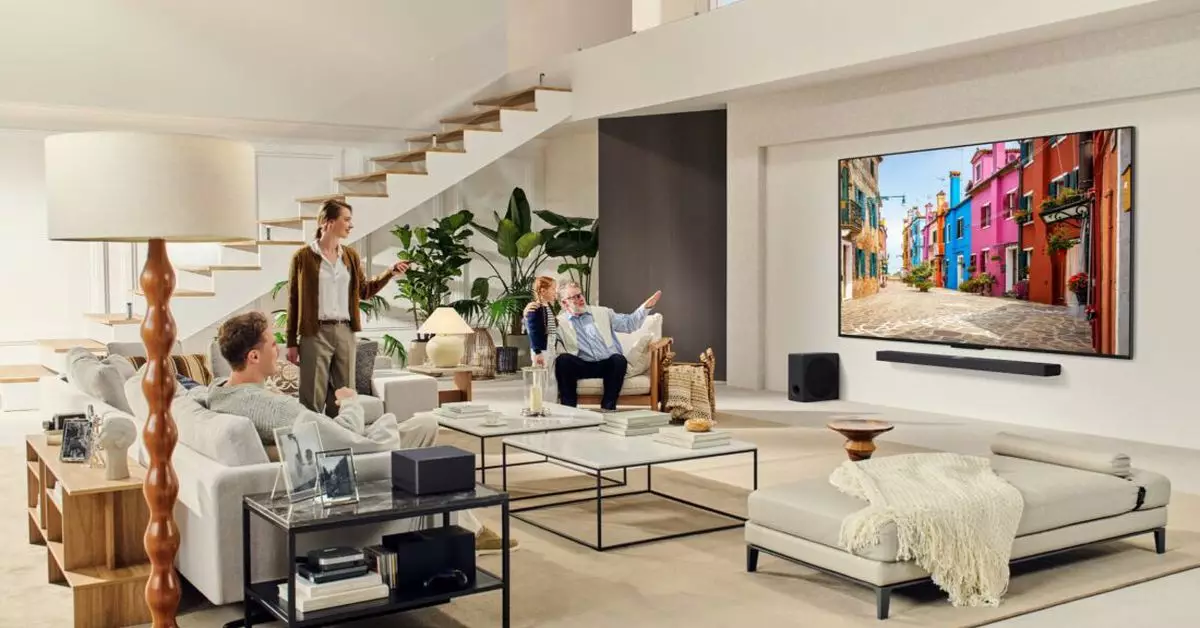In the ever-accelerating world of consumer electronics, particularly personal audio and home theater systems, trends tend to exhibit a cyclical pattern. New technologies often make their debut at high price points, creating a buzz before gradually transitioning to more accessible models. A notable example of this phenomenon is LG’s Zero Connect Box, which marked its first appearance with the M Series OLED in 2023 and is now making its way into LG’s QNED Evo Mini LED series.
The Zero Connect Box offers a groundbreaking approach to connecting devices, allowing for the transmission of 4K video at impressive refresh rates of up to 144Hz. This technology minimizes cable clutter, as the only wiring required is a power connection to the TV, thereby enhancing the aesthetic appeal of modern home entertainment setups. Reviews from the prior year highlight that the device functions smoothly, offering gamers and multimedia enthusiasts a seamless experience.
One significant shift in LG’s technology for 2025 is its decision to explore new methods for color representation. The company is foregoing traditional quantum dot technology in favor of a proprietary solution branded as Dynamic QNED Color Solution. LG claims that this new approach produces colors that closely mimic human perception, leading to an enhanced viewing experience that vibrant yet natural. This pivot underscores LG’s ambition to remain at the forefront of picture quality and user satisfaction within a competitive market.
However, the commitment to innovation brings forth a set of expectations and challenges. While LG projects confidence in its new color technology, consumers will likely scrutinize how it performs in real-world conditions. Will the claims of “pure colors” hold up in rigorous assessments against competing brands? The future of LG’s reputation may hinge on the success of this new technology.
With the rise of artificial intelligence across various tech sectors, LG is positioning itself as a player in this emerging field, particularly regarding smart televisions. A key feature in LG’s upcoming QNED lineup is the introduction of an AI button on the Magic Remote, signaling a distinct shift in how users will interact with their TVs. While this may appear innovative, it raises questions about user preference and necessity.
The AI functionality allows users to perform contextual searches and receive tailored recommendations based on their viewing habits. For instance, a simple request for movie suggestions set in Paris could yield a curated list reflecting personal tastes. Yet, one must ask whether this level of intelligence is truly desired in a television remote or if it risks complicating a device that is traditionally user-friendly.
Moreover, the impact of AI integration extends beyond merely suggesting content. LG asserts that it will enhance upscaling techniques and provide advanced sound processing capabilities, such as transcending standard two-channel audio into an immersive 9.1.2 virtual experience. While these advancements promise to refine sound quality and clarity, they must be evaluated through the lens of practicality. Can AI genuinely improve our television viewing experience, or does it merely add layers of complexity?
While LG’s announcements undoubtedly stir excitement within the tech community, they are accompanied by uncertainties regarding pricing and availability. Traditionally, CES (Consumer Electronics Show) serves as a stage for showcasing impressive technologies long before consumers learn the actual costs associated with them. This leads to a dissonance between initial enthusiasm and potential sticker shock down the line.
As consumers become increasingly conscious of price-to-performance ratios, understanding the market implications of LG’s new offerings will be critical. The ability of LG to deliver these innovations at competitive price points will likely determine their acceptance within a discerning consumer base that is eager for technological advancements but reluctant to overextend their budgets.
LG’s efforts to push the envelope in home entertainment technology are commendable, driving forth innovations that can redefine user interaction and experience. However, this path is fraught with challenges, from delivering on ambitious promises to navigating consumer desires amid complex functionalities. As the consumer electronics landscape evolves rapidly, LG must balance its desire for advancement with practical solutions that meet the actual needs of users, ensuring that innovation doesn’t come at the cost of usability. The upcoming CES 2025 promises to reveal how LG and its new technologies will fare in a competitive arena defined by high expectations and informed consumers.

